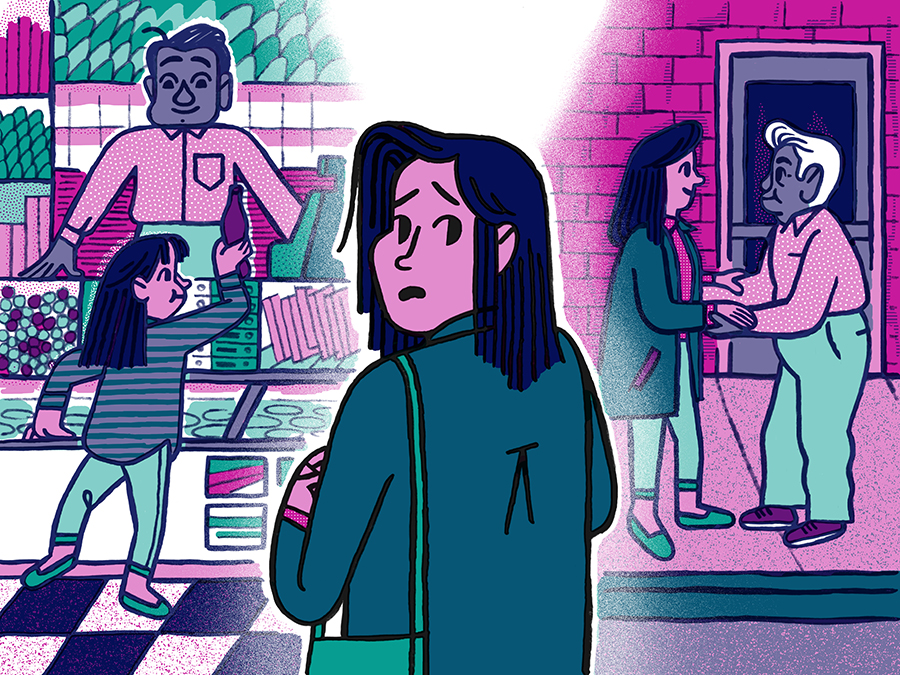

Illustration: Vinnie Neuberg
My goal was to get my phone upgraded and walk home. I no longer took subways. I was too afraid. I saw a brown-skinned man turn around and look at me. He crooked his head and tilted his body closer to mine. I felt nervous. Why was he coming toward me?
If you were in New York during 9/11 you remember the eerie days that followed the horrific attack. The smell of burned ashes still wafted in the wind. No one yelled. No sirens blared, just the deafeningly loud footsteps of people passing by. It was on those days I felt the most anxious.
I was in downtown Brooklyn during the aftermath. I joined the mobs of people desperate to get new cell phones. We wanted to ensure that we’d always have a way to connect with our loved ones, to never be out of touch or reliant on the long lines for pay phones again.
He was still staring at me. I thought of the news, all those fearful citizens attacking innocent people now, especially those who looked like him. I wasn’t going to be that person. I wasn’t broken.
As I walked toward the Sprint store, I heard sobs from a person walking by. I wanted to console them, but couldn’t.
I thought back to volunteering at the local fire house just days before, how the tall handsome fireman with the blue eyes fell apart in my arms screaming, “My brothers are gone. “ I was convinced that if I let go, this strong man would perish.
He was still staring at me. I thought of the news, all those fearful citizens attacking innocent people now, especially those who looked like him. I wasn’t going to be that person. I wasn’t broken.
Then, he slowly approached me. He was clean-shaven and dressed in khakis and a button down shirt. He had a soft, friendly smile, which made me feel oddly at ease. But still a part of me began to shake inside.
Even before the attack, I didn’t tell people where I lived. I was a New Yorker.
He began to speak. He had a slight accent but I could not detect from where.
“Where’re you from?” he asked.
I hesitated and then answered. “Brooklyn,” I said.
“But, where? Where do you live?” He asked.
“I live here,” I said nervously.
Even before the attack, I didn’t tell people where I lived. I was a New Yorker. He squinted his eyes while his smile grew.
“You’re not from another place? Not from Ditmas?”
I was. How did he know? Did I actually know him?
My shoulders began to uncoil.
“We had a store on Coney Island Avenue. Didn’t you used to go there?” he asked.
And then my heart sank. I knew exactly who he was. His hair was gray but his warm face still the same.
“Yes, I remember, you used to let me buy cigarettes,” I said.
“You came in every day, I watched you grow up,” he said proudly.
I wanted to hug him and thank him for letting me buy Benson and Hedges Deluxe Ultra-Light Menthols and throwing in free candy sometimes just because he was nice.
He was the owner of the bodega around the corner from my house. This man I hadn’t recognized had watched me grow from a child in an angry teenager, to now a thirty-year-old woman.
“How’s your family?” he asked.
“They’re well. We moved though,”
“Me too,” he said. And gestured to the block we were standing on, one of the most expensive in Brooklyn.
I wanted to hug him and thank him for letting me buy Benson and Hedges Deluxe Ultra-Light Menthols and throwing in free candy sometimes just because he was nice. I wanted to tell him, that I almost didn’t say hello to him, because I was frightened and foolish.
Instead, we grasped hands for what felt like infinity. In that exchange I felt both his love and his fear.
“Be well,” he said.
“You too,” I said meaning it more than usual.
For that minute the silence was broken. There we stood, two New Yorkers. United.

